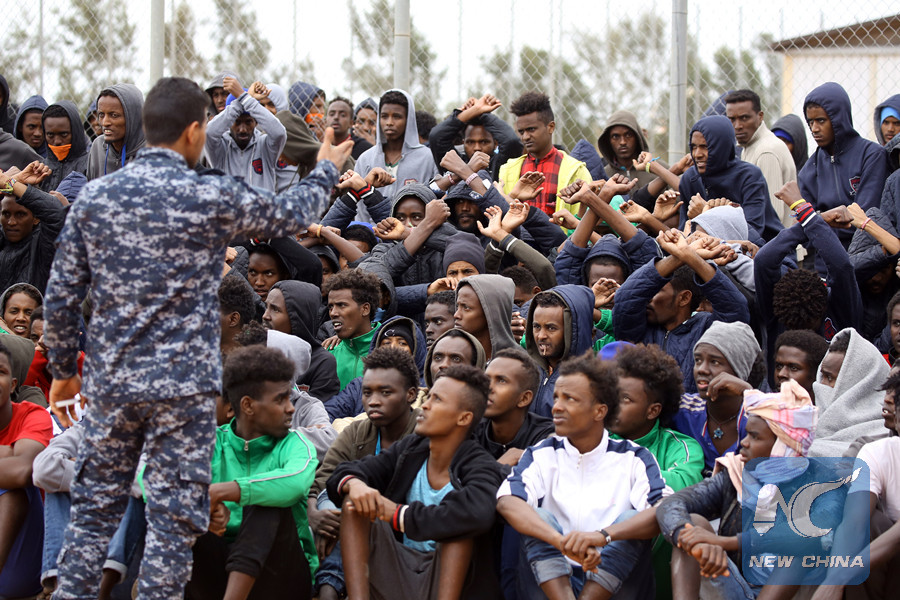
Illegal immigrants raise their hands protesting their detention and demanding deportation to Europe at Al Hamra housing center in Gharyan city, Libya, on Feb. 2, 2018. The International Organization for Migration (IOM) has deported 20,000 illegal migrants voluntarily from Libya to their countries of origin in 2017. (Xinhua/Hamza Turkia) (srb)
TRIPOLI, Feb. 6 (Xinhua) -- Stefano Chammen is a 27-year-old illegal immigrant from Eritrea, who is now in the Al-Hamra refugee center in Gharyan city, some 75 km south of the Libyan capital Tripoli.
He recently told Xinhua about his difficult and risky trip, which took him more than a year to reach Libya's Sabratha coast, from where he was hoping to reach European shores like many of his African peers did.
"I left my country in mid-2016, at which period many young people cannot find jobs, and therefore they go to Europe through Libya, looking for settlement in a foreign country that offers us a decent life," Chammen said.
"I entered Sudan, and from there to Kufra in southern Libya. Then, Libyan and Sudanese smugglers transferred me to the city of Bani Walid near Tripoli. I was detained for a full year there," he added.
Chammen was detained because his family could not afford the 7,000 U.S. dollars demanded by an Eritrean human smuggler.
"But eventually, my family paid the money after selling our modest house. After that, I was transferred to Tripoli by a truck along with 187 migrants hiding under a plastic wrap. We had fainted for multiple times because the truck was overcrowded and tight," Chammen said.
On his way to the eventual destination Sabratha, Chammen and other immigrants were kidnapped by gunmen from Zaweya city, a place less than 25 km from Sabratha.
The immigrants were taken to a farm and held for 45 days, given little food and severely beaten. The kidnappers filmed them and asked for a ransom of 1,500 dollars. They were released after the Eritrean smuggler paid the money.
"From there, we were transferred to Sabratha in July 2017," Chammen added.
"After arrival in Sabratha, we were overwhelmed by an unimaginable joy. The dream of Europe began to tickle our imagination," he described.
But the war suddenly erupted with the involvement of the smuggling network. Chammen was held in a small house off the city coast until he was arrested early last October.
"I was taken to Gharyan. Since then, I have been waiting for representatives of international organizations to fulfill promises to move us from Libya to Europe," he said.
After weeks of fighting in Sabratha, forces of the Anti-IS Operations Chamber took over the city, which was Libya's main crossing point of illegal immigrants to Europe.
The operation, which killed more than 40 people and injured 200, came to an end after withdrawal of Anas al-Dabbashi and the 48th Infantry Battalion from the city earlier in October. The two groups are accused by the chamber of human smuggling and trafficking along the city's shores, as well as kidnapping of businessmen and abuse of migrants.
Smuggling gangs transport migrants through boats across the Mediterranean to Italian shores on a risky journey that takes only a few hours.
Bahlul Shnana, official of immigration housing centers in Gharyan, believed that the uncontrolled flow of migrants into Libya has caused serious security and social risks. "It requires cooperation of Libya's neighbors and international organizations concerned to find a final solution for inmates of our shelters."
"We have seized criminal networks with evidence engaging in illegal acts, such as trafficking of drug, arms and prostitutes, as well as infiltration of terrorist groups among illegal immigrants to Libya," Shnana told Xinhua.
"We have to protect ourselves from any dangers that migrants bring with them, because the issue has become a matter of national security that we need to be careful about," Shnana added.
"This does not rule out the right of migrants to live in dignity. Their governments have not dealt with their economic situation, which is the basis for their departure on dangerous trips. International organizations concerned with migrants have not fulfilled their promises that European countries would receive them and grant them humanitarian asylum," Shnana explained.
Illegal immigration centers, run by the Ministry of the Interior's Anti-Illegal Immigration Department, receive tens of thousands of immigrants, mostly Africans and some Asians.
Immigrant shelters in Libya house illegal immigrants until they are settled by international organizations for voluntary repatriation to their countries of origin or resettlement in a third country in Europe.
The International Organization for Migration (IOM) has deported 20,000 illegal migrants voluntarily from Libya to their countries of origin in 2017.
The voluntary return program, implemented by the organization in Libya since 2006, arranges the return of illegal migrants stranded in Libya to their countries of origins.

